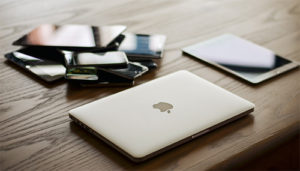Why do you need to offer flexible, meaningful and engaging roles to millennials?
To answer this question, we need to understand who millennials are and how they grew up.
THE MILLENNIAL WORKFORCE
Millennials are the first digital generation, born between 1982 and 2004.
With rapid technological development, the mid-2000s marked a fundamental shift in the relationship between work life and personal life.
I witnessed this shift as a millennial. I grew up observing this technological transformation first hand. I remember the slow, awkward dial-up tone that connected us to the internet.
I now have an iPhone 6S, and that’s not even the most recent model.
My parents, part of the Baby Boomer generation, grew up without the instant, ‘anywhere’ connectivity that came with the explosive adoption of the smartphone.
Before the era of the smartphone, ‘work’ and ‘life’ were easier to separate and, for most, it was possible to achieve a ‘work-life balance’. Work was left at work.
Seeing those before them achieve the elusive work-life balance, millennials have sought it for themselves. Yet, there is a growing realisation that it no longer exists.

THE MILLENNIAL WORK CULTURE
Work-life boundaries began to erode around 2002 with the release of the popular Blackberry smartphone, which targeted corporations. Five years later the first iPhone arrived and the era of constant connectivity dawned.
A recent survey of 200 executives found “a decrease in the amount of leisure and personal time as a result of work-life integration”. This was “mainly due to an increase in globalisation and mobile technology, which required many of them to be available outside of their normal working hours.”
Other studies have shown that in the space of 5 years, from the explosion of the smartphone market in 2007 to the rise of social media, our work-life boundaries became increasingly blurred, particularly “as people began to seek connectivity across work and non-workspaces.”

Recent research has reinforced this idea. One survey found that “33% of mobile workers admitted that they check their phones for emails and messages throughout the night.” Scarily, it also found that “nearly 50% [of mobile workers] wouldn‘t even think of going to bed without their Smartphones tucked under their pillows.”
The invasion of smartphones – and your work email – into your bedroom surely marked a pivotal moment in the nature of work-life balance. In 2013, Emily White, a Facebook Executive, coined the term ‘work-life merge’. It described the new reality of professional and personal lives being blended together.
HOW TO ENGAGE YOUR MILLENNIAL EMPLOYEES IN THE ‘WORK-LIFE MERGE’ ERA
What does this mean for your recruitment practices in this increasingly connected world? How can you attract millennials in this new world of blurred lines between work and personal life?
You must recognise and embrace the more flexible millennial work culture and retire the outdated, inflexible ‘work-life balance’ model.
The ‘work-life merge’ or ‘work-life integration’, marks the beginning of the future: flexi-work. With the continual advancement of mobile technologies, it’s clear that the more fluid our ‘work-life’ boundaries become, the more you will need to move towards a flexible working structure.
Stuart Hearn, CEO of Clear Water, a performance management software, highlights that flexible working practices are needed by millennials. He believes that, “by the year 2020, almost 50% of the workforce will comprise of millennials” and that “to get the best out of this generation, a degree of flexibility is required”.

Connective devices

There's no other place in the known universe that humans could inhabit without the use of spaceships and spacesuits. So we should take care of our planet.


